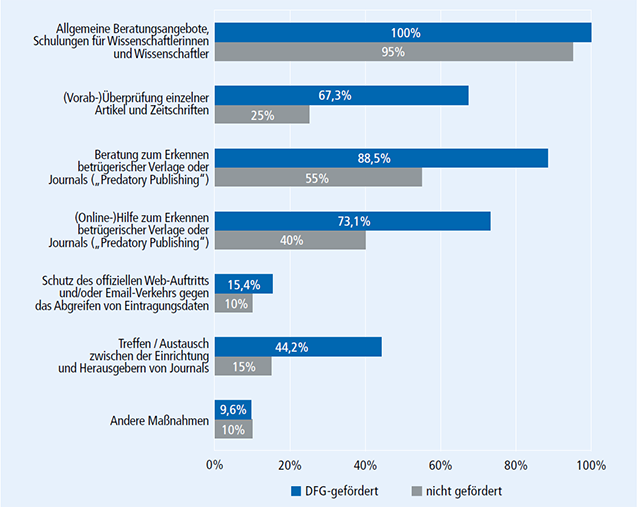FAQ: Predatory Journals
If an article is published in a “predatory journal”, does that mean it is a bad article?
The quality of an academic paper or conference paper can only ever be judged based on the individual publication. In many subject areas, the peer review process serves to ensure that an article is of good quality. If an article is published without having been peer reviewed, this does not necessarily mean that it is a bad article. It simply means that it has not been assessed by an other researcher - it has only been published based on the expertise of the author.
The DFG is careful to ensure that publications undergo a recognised quality assurance procedure. Open peer review, post publication peer review and community peer review, etc. are generally recognised as acceptable quality assurance procedures in addition to a traditional peer review, provided that the process includes verification and correction opportunities either before or after publication.
How do you recognise a “predatory journal”?
The decision on where to publish should always be an informed decision (see also Guideline 15: Guidelines for Safeguarding Good Research Practice (2019)). The “Think. Check. Submit.” initiative, which is supported by publishing industry associations and library associations, gives researchers a helpful checklist to assess the trustworthiness and reliability of a scholarly journal.
An overview of gold open access publications can also be found in the Directory of Open Access Journals (DOAJ). Authors should check journals which are not listed in this directory of quality-assured open access journals for various aspects concerning reliability, such as editorship, quality assurance procedures, location of the publishing house etc. The open access officer at the author’s university may also provide assistance on this issue.
- DFG Guidelines for Safeguarding Good Research Practic(externer Link)
- Guidelines for choosing a suitable publication mediu(externer Link)
- “The Directory of Open Access Journals” (DOAJ(externer Link)
- Overview of open access officers at German universities and research institution(externer Link)
What action does the DFG take against “predatory journals”?
The DFG takes active measures against predatory journals at various levels.
The “Guidelines for Safeguarding Good Research Practice”, which were published by the DFG in 2019, also contain explicit advice on choosing a publication medium. All members of the DFG are obliged to implement these guidelines.
From a science policy perspective, in 2018 the DFG issued a statement on the quality assurance of scientific publications together with eight partners from the Alliance of Science Organisations.
In terms of project funding, the DFG included the criteria for quality assurance in relevant funding programmes, for example in the “Open Access Publication Funding” programme.
- DFG Guidelines for Safeguarding Good Research Practic(externer Link)
- Statement by nine partners from the Alliance of Science Organisations on quality assurance procedures relating to scientific publications (in German only(Download)
A number of open access quality assurance measures are also already in place at universities and universities of applied sciences, which can be seen in the 2020 evaluation of the DFG’s “Open Access Publishing” funding programme (2010-2020; see graphic).
Existing open access quality assurance measures at universities and universities of applied science

grafik_open_access

Datenbasis und Quelle: JOANNEUM RESEARCH: Onlinebefragungen Einrichtungen. Geförderte Einrichtungen N=52. Nicht geförderte Einrichtungen N=20, ohne Antwort N=10.
Datenbasis und Quelle: JOANNEUM RESEARCH: Onlinebefragungen Einrichtungen. Geförderte Einrichtungen N=52. Nicht geförderte Einrichtungen N=20, ohne Antwort N=10.
Download Graphic: "Existing open access quality assurance measures (in German only)(Download)